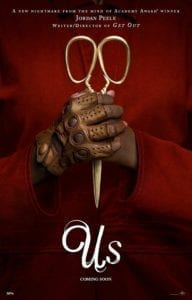Dissecting One Of The Best Horror Films of 2019: Jordan Peele’s ‘Us’
One of the most controversial and most talked about horror films of this year or any recent year has been Jordan Peele’s critically-acclaimed “Us,” which is now available on video and streaming services.
I saw “Us” in Austin, at South By Southwest, where it premiered in March, and I’m still letting my thoughts on “Us” and its meaning percolate. Here are 10 possible explanations for plot points in “Us.” WARNING: SPOILERS IF YOU HAVEN’T SEEN THE FILM.

- It has been pointed out by someone other than me that “Us” is, basically, “U.S.”, i.e. United States.
- There seems to be a rather large not-very-veiled message about racism in America. This isn’t surprising, since the main cast is African American. I’ve read that Jordan Peele admires Spike Lee, who is outspoken in his films and in his life, and speaks and writes bluntly about the black experience in America. It’s clear that Spike feels that the black race has been put down and short-changed; I’m not arguing with him. (I actually heard him speak “live” once at Augustana College and just a quick look at his films will support me here. Personal observation: I think it’s one of the reasons Spike Lee didn’t even get an Oscar nomination until this year and didn’t win for Best Picture (although the script did snag an Oscar). Spike’s been making movies—-some of them terrific—-for 30 years or so, but has never been recognized until this year, and he is a somewhat prickly character known for a few famous feuds. He was even prickly during his speaking engagement and “does not suffer fools gladly.” In fact, I remember reading that Spike Lee got the assignment to do “BlackKKlansman” because it was first offered to Jordan Peele, hot off of “Get Out,” who suggested it would make a great Spike Lee joint film. A line from late in the film (when what passes for an “explanation” of the doppelgangers is being given): “Your people took it for granted. We’re human, too, you know.” Given the United States’ history with slavery, the concept of a “race” of people relegated to living in subterranean squalor while those above ground live the good life seems to fit, historically. Here’s a line that Lupita Nyongo’s character speaks: “The tethered saw that I would deliver them from their misery.” And the Lupita Nyong’o double says, to the girl who encountered her in the fun house all those years ago: “You could have taken me with you.” Here’s another line regarding the red-robed figures who seem to have risen up in some sort of terrorist overthrow of the city of Santa Cruz (and beyond, judging from the uninterrupted line of them, holding hands, that we see stretching into the distance of the mountains with helicopters hovering overhead): “I didn’t need to just tell you but to make a statement that the world would see. It’s our time up there.”
- There is much made of a Bible verse in the film: Jeremiah 11:11 (King James Version) “Therefore thus saith the Lord, Behold, I will bring evil upon them, which they shall not be able to escape; and though they cry unto me, I will not hearken unto them.”Not only is the verse held up by a random man on a placard at the beginning AND the end of the film, at one point Lupita’s son points to the clock in his room, which is on 11:11 at that time. Fits in with Point #2, as to how African Americans, who were brought over on slave ships and forced to work in the cotton fields of the South and treated inhumanely, feel it is “their” time. It also has a nice duality.
- What about the rabbits? [We have to assume that they aren’t just left-over props from “The Favorite.”] They’re white. One of the doppelgangers cuts the head off a small white rabbit doll. Draw your own conclusions. Here in Austin, on the Red Carpet, Jordan Peele claimed that he finds rabbits very creepy, with eyes like a psychopath.
- As has been said, “We have met the enemy and he is us.”
- What about the “hands across America” 6.5 million strong of May 25,1986? It was largely a symbolic gesture, since it raised $84 million, but, after expenses, only $15 million was actually donated. In this way, it falls in line with a lot of other “symbolic” but largely ineffectual gestures that we, as Americans, participate in, like the record “We Are the World.” (Remember, at one point, Lupita’s red-robed character says, “We are Americans.”)
- There is also the matter of the house of mirrors changing, by film’s end, from having an American Indian atop it with the words “Shaman’s Vision Quest: Find Yourself” to a Wizard figure with a different name. Treatment of American Indians goes into the “shameful” category, along with slavery and Japanese interment in WWII. In this way, the use of the Indian imagery but the change later seems to “gloss over” America’s crimes of conscience in the same way that hyped “feel good” events like “We Are the World” or “Hands Across America” were ineffectual gestures that did little to solve real problems or stop real abuses, but were offered up by the PTB (usually, white men) as stop-gap feel-good largely symbolic and self-congratulatory gestures.
- The red-robed killers remind of nothing so much as “The Handmaid’s Tale” on Hulu, outfits which signal repression and injustice; both sexes wear these red outfits. Supposedly, like the pods in “The Invasion of the Body Snatchers” movies, there is one red-robed thing for every inhabitant of the U.S. [This seems extreme and unlikely. What does a doppelganger do all day underground? How does a doppelganger secure sustenance beyond raw rabbit meat? Unlikely that this movement of this magnitude could be kept secret and one of the weaker plot points,—-if that is, in fact, a plot point.] The speculation centers on the U.S. government having had some sort of “pilot” experimental program to duplicate every citizen, which was scrapped when it was discovered that the person’s “soul” could not be cloned.
- The doppelgangers who have been “kept down” have lost their voices entirely or are barely able to speak in a whisper. They aren’t heard. They aren’t listened to; they are essentially inarticulate. There is speculation that the reason Lupita’s character does all the for the group of four in a hoarse croak is that she “remembers” how to speak from before. (If you don’t know what I mean about “from before” think of the twist ending of the film.)
- Now, how does the “surprise” ending of the film fit with Point #2, above? As I was walking to my car, a young man was talking and said, “How does all of this fit, now that we know that the bad one is the good one and vice versa?” How, indeed. (Don’t say I didn’t warn you about “spoilers.”)
- It has also been pointed out that the main message of the film doesn’t have to be racial, but can also be simply “haves” vs. “have nots.” Very true.
So, see it and figure out what YOU think it all means and let me know.
Advertisement









